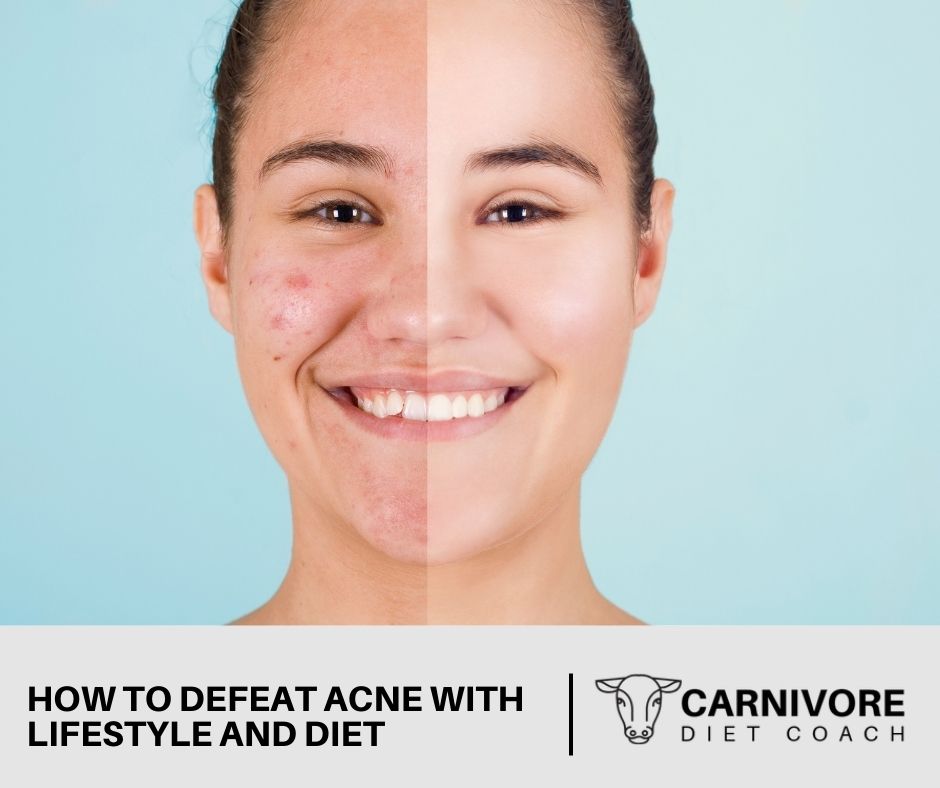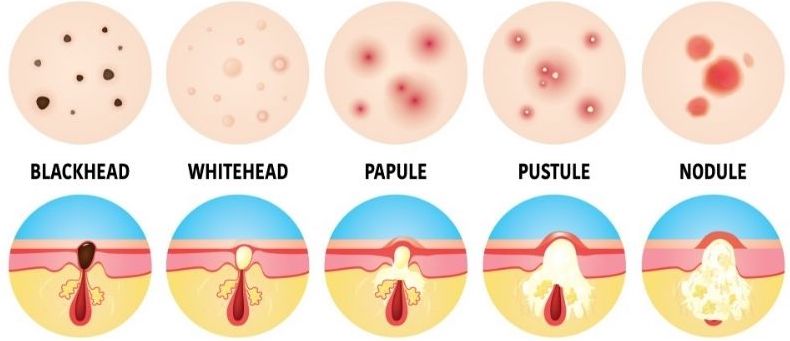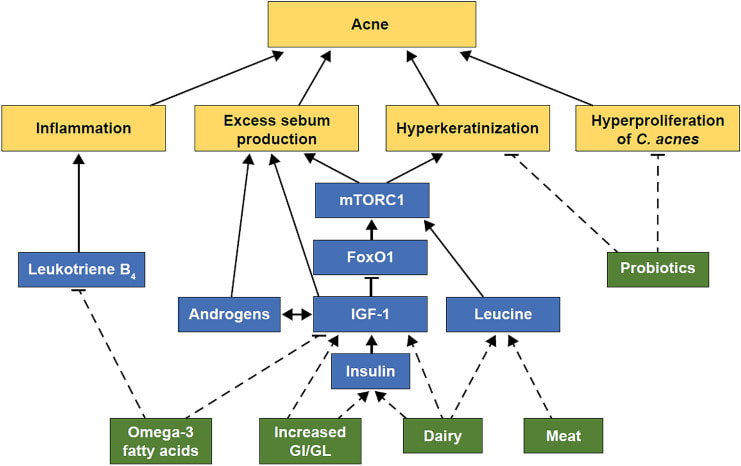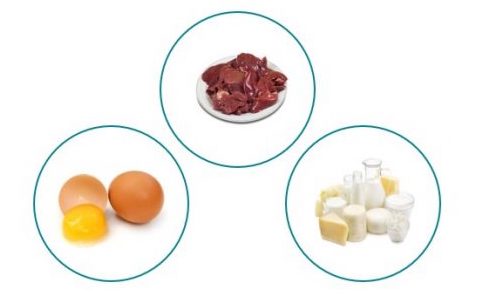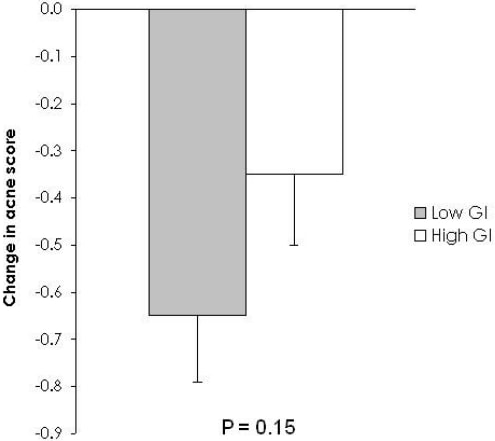|
THE COMPLETE
CARNIVORE DIET GUIDE
Learn how to lose weight, fix your gut and cure autoimmune symptoms with our free Carnivore Diet guide.
|
|
Can the carnivore diet help with acne? Acne is not normal, nor is it evolutionary consistent. It's time to take a step back and look at the bigger picture. Clear, glowing skin isn't just about what you put on your face – it's about what you put in your body. In this comprehensive guide, we'll delve into the lifestyle and diet changes you can make to defeat acne once and for all. From understanding the role of hormones and stress to incorporating skin-healthy foods into your diet, we've got you covered. Say goodbye to harsh chemicals and expensive treatments – with our tips and tricks, clear skin is within reach. So, are you ready to take control of your skin and transform your life? Let's get started. Understanding Acne: What Causes It? Acne is a common skin condition that affects individuals of varying ages and skin types. It is caused by a combination of factors that include excess sebum or oil production, clogged pores, bacteria, inflammation, and hormonal changes. The sebaceous glands produce sebum and help keep the skin moisturized, but when produced in excess, it can clog pores and cause acne. When pores become clogged with excess sebum, dead skin cells, and bacteria, they can form blackheads, whiteheads, and pimples. Additionally, hormonal changes during puberty, menstruation, pregnancy, and menopause can also contribute to the development of acne. Other factors that can trigger acne include stress, certain medications, and a diet high in processed foods, sugar, and dairy. It's important to note that while these factors can contribute to the development of acne, they may not affect everyone similarly. Understanding what causes your acne is essential to determine how to manage and treat it effectively. The Link Between Diet and Acne Research has shown that there is a connection between diet and acne. Studies have found that a diet high in processed foods, sugar, and dairy may contribute to the development of acne. This is because these foods can cause an increase in insulin levels, which can lead to an increase in sebum production and inflammation in the body. Additionally, some research has suggested that a diet low in specific nutrients, such as zinc, vitamin E, and vitamin A, may also contribute to the development of acne. These nutrients are essential for maintaining healthy skin and immune function, and a deficiency in them can increase acne risk. While the link between diet and acne is not fully understood, making dietary changes can effectively manage and prevent acne. Foods to Avoid for Clear Skin If you're struggling with acne, it may be worth taking a closer look at your diet. Here are some foods that may be contributing to your acne: Sugar: Foods high in sugar, like candy, soda, and baked goods, can cause a spike in blood sugar levels. This can lead to inflammation in the body, which can trigger acne. Dairy: Some studies have found a link between dairy consumption and acne. This may be because dairy products contain hormones that can contribute to acne development. Processed Foods: Foods high in refined carbohydrates, like white bread and pasta, can cause a rapid rise in blood sugar levels. This can lead to inflammation in the body and contribute to acne development. How to Eat for a Clearer Skin If you're eating mainly animal foods, it might be hard to know which foods to include or which ones to cut if you'd like to get rid of your acne. Let's take a look at the critical aspects of diet for clearer skin. #1. Consume Enough Vitamin A Vitamin A is one of the most essential vitamins for maintaining healthy skin and plays a significant role in preventing acne. This essential nutrient helps to maintain healthy skin cell turnover, which is crucial in preventing the buildup of dead skin cells and excess oil that can contribute to the formation of acne. This study investigated the plasma levels of vitamins A and E in individuals with acne and compared them to a control group. The results suggested that lower levels of vitamin A were found in acne patients, while there was no significant difference in vitamin E levels. Here are how vitamin A helps prevent acne: Regulates sebum production: Vitamin A helps regulate sebum production, which is the oil produced by the skin. When the sebaceous glands overproduce oil, it can clog pores, leading to acne. Vitamin A helps balance this process, reducing the likelihood of developing acne. Prevents the formation of comedones: Comedones are small bumps on the skin that can develop into blackheads or whiteheads. Vitamin A helps prevent the formation of comedones by reducing the amount of keratin that accumulates in hair follicles, which can block pores and lead to acne. Reduces inflammation: Inflammation is a critical factor in the development of acne. Vitamin A helps to reduce inflammation by inhibiting the production of inflammatory cytokines. Boosts skin cell turnover: Vitamin A helps to increase the turnover of skin cells, which can help prevent the buildup of dead skin cells on the skin's surface. This can reduce the likelihood of developing acne. It is crucial to have enough vitamin A in the body because a deficiency in this nutrient can lead to dry, flaky skin and increased susceptibility to skin infections. However, it is essential to note that too much vitamin A can also lead to adverse effects, including acne-like symptoms, dry skin, and hair loss. It is worth checking your levels before adding extra vitamin A foods to your diet. Usually, you hear that the best source of vitamin A is vegetables and fruits of orange colors, like oranges or carrots, in the form of carotenoids. However, converting carotenoids to vitamin A in humans is inefficient. Therefore it is essential to ensure an adequate intake of the active form of this vitamin. Animal liver and fats are the optimal sources of vitamin A, as it is primarily stored in these tissues. Among them, beef liver is the most abundant source of vitamin A in the form of retinol. A mere serving of 100g (equivalent to ¾ cup) of beef liver contains a large quantity of 15,000 IU of vitamin A. Other great retinol sources are egg yolks, butter, and oily fish. #2. Stop Eating Processed Foods Cutting out processed food has proven to help clear up acne-prone skin. Processed foods contain a high amount of refined sugars, preservatives, and artificial flavors, which can trigger acne breakouts. These foods also contain seed oils, which are high in omega-6 fatty acids, causing inflammation and hormonal imbalances in the body, leading to acne. This case-control study investigated the association between dietary factors and acne vulgaris in Malaysian young adults. The findings suggested that a high glycemic load diet, as well as regular consumption of milk and ice cream, were associated with an increased risk of acne. Sugary snacks, such as candy, cookies, and soda, have a high glycemic index, quickly raising blood sugar levels and leading to insulin spikes. Insulin spikes stimulate oil production in the skin, increasing the likelihood of clogged pores and acne. Moreover, many processed foods contain additives and preservatives that can disrupt the natural balance of the gut microbiome, leading to inflammation and immune system dysfunction. Research has shown that gut health plays a significant role in skin health, and a diet high in processed foods can negatively impact the skin. This randomized controlled trial investigated the effect of a low glycemic index (GI) diet on acne vulgaris. The results suggested that participants in the low GI diet group experienced a reduction in inflammatory acne lesions compared to those in the high GI diet group. By cutting out processed foods, you can reduce the amount of refined sugars, seed oils, and artificial additives in your diet, reducing inflammation and clear skin. #3. Reduce Caffeine Intake Reducing caffeine intake may be beneficial in clearing up acne-prone skin. Caffeine is a stimulant that can cause a spike in stress hormones, leading to increased inflammation in the body. This inflammation can result in acne breakouts for some individuals. Moreover, caffeine can disrupt the adrenal glands' normal function, which produces hormones that regulate the body's stress response. When these glands are overstimulated, they can produce too much oil, leading to clogged pores and acne. Reducing caffeine intake can help reduce stress hormones and decrease inflammation, improving acne-prone skin. Consider switching to decaf or reducing your caffeine intake by limiting your consumption of coffee, tea, energy drinks, and other caffeinated beverages. Additionally, you can focus on drinking water and herbal tea to stay hydrated and support their overall health and well-being. #4. Forget About Milk Cutting out milk is often essential in promoting acne-free skin. Milk contains hormones such as insulin-like growth factor 1 (IGF-1) and androgens that can stimulate oil production, leading to clogged pores and acne breakouts. This meta-analysis examined the relationship between dairy intake and acne development. The results indicated a positive association between total dairy intake, as well as milk consumption specifically, and the risk of acne. Additionally, milk is high in sugar in the form of lactose, which can cause inflammation, leading to acne. Furthermore, milk can disrupt the natural balance of the gut microbiome, leading to inflammation and immune system dysfunction that can result in acne. Research has shown that gut and skin health are closely linked, and an imbalance in gut bacteria can lead to skin issues. Cutting out milk and other dairy products may reduce the amount of IGF-1 and androgens in the body, lower inflammation, and improve gut health, leading to clearer skin. #5. Focus on Omega-3 Fatty Acids There are several reasons why consuming omega-3 fatty acids can be beneficial for clearing the skin of acne: Anti-inflammatory Properties: Omega-3 fatty acids have anti-inflammatory properties that can help reduce inflammation in the skin. Hormonal Regulation: Omega-3 fatty acids can help regulate hormones, particularly androgens, which can contribute to acne. Increased Skin Hydration: Omega-3 fatty acids help improve skin hydration, preventing dryness and flakiness that can contribute to acne. Hydrated skin is less likely to develop clogged pores. Antioxidant Properties: Omega-3 fatty acids have antioxidant properties that can help protect the skin from oxidative stress and damage. This can help prevent the formation of acne and other skin problems. Overall, consuming omega-3 fatty acids can help reduce inflammation, regulate hormones, improve skin hydration, and provide antioxidant protection, all of which can help clear the skin of acne. The best animal sources of omega-3 fatty acids are fatty fish like salmon, sardines, or mackerel, grass-fed meat, eggs, and shellfish. 6. Don't Forget About Probiotics Some evidence suggests that probiotics may help with acne by improving gut health and reducing inflammation. Probiotics are beneficial bacteria that live in our gut and can be consumed through food or supplements. The health of our gut is closely tied to our overall health, including our skin. Studies have suggested that people with acne may have an imbalance of bacteria in their gut, which can result in inflammation and contribute to the development of acne. By introducing beneficial bacteria through probiotics, it may be possible to rebalance the gut microbiome and reduce inflammation, leading to clearer skin. Additionally, some probiotics have been shown to have antimicrobial properties, which may help to reduce the amount of acne-causing bacteria on the skin. Carnivores can get probiotics from the following sources: Bone broth: Bone broth is made by simmering animal bones for an extended period, which can release nutrients, including collagen, gelatin, and amino acids that can help to heal the gut and support the growth of beneficial bacteria. Organ meats: Organ meats like liver and kidney are rich in nutrients that can support gut health and provide beneficial probiotics. They contain prebiotics, which feed the beneficial bacteria in the gut and are also high in minerals and vitamins. Raw dairy: For carnivores that consume dairy, raw dairy products like cheese, kefir, and yogurt can provide a good source of probiotics. Raw dairy products are not pasteurized, which means they contain live bacteria that can contribute to gut health. Curing Acne With The Carnivore Diet The carnivore diet is an extreme form of the low-carbohydrate, high-fat (LCHF) diet that emphasizes the consumption of animal products while excluding most plant-based foods. While there is limited scientific research specifically examining the effects of the carnivore diet on acne, there are lots of studies showing the impact on removing certain food groups, restoring your gut microbiome and becoming metabolically healthy. Other Things you Can Do The carnivore diet may potentially help with acne by limiting trigger foods commonly associated with skin issues, restoring metabolic health through reduced carbohydrate intake, reducing inflammation by eliminating potential irritants, and potentially improving gut health by removing potential allergens and optimizing nutrient absorption. Hydration and Acne Staying hydrated is essential for overall health, but it can also help promote clear skin. When you're dehydrated, the skin can become dry and flaky, leading to clogged pores and acne. Aim to drink at least eight glasses of water a day to keep your skin hydrated and healthy. Sleep and Acne Getting enough sleep is essential for maintaining healthy skin. When we sleep, the body produces collagen, which helps keep the skin looking youthful and radiant. Lack of sleep can also increase stress hormones, contributing to acne development. Aim to get at least seven to eight hours of sleep each night to promote clear skin. Exercise and Acne Regular exercise is not only beneficial for overall health, but it can also help promote clear skin. Exercise helps increase blood flow to the skin, which can help promote a healthy, radiant complexion. It also helps reduce stress, which can contribute to acne development. Aim to get at least 30 minutes of moderate exercise daily to promote clear skin. Sun, Red Light, and Acne One fundamental way sun exposure may help prevent acne is through its impact on vitamin D levels. Vitamin D is an essential nutrient that plays a role in the health of the skin and the immune system. Research suggests that people with acne may have lower vitamin D levels than those without the condition. Exposure to sunlight triggers the production of vitamin D in the skin, which helps reduce inflammation and improve the skin's overall health. This only works if you don't apply sunscreen, so aim to be out in the morning or later in the afternoon. Alternatively, you can try red light therapy to see if it helps your skin to clear. Summing Up While acne can be frustrating to deal with, there are steps you can take to promote clear skin. By incorporating a carnivore diet for acne, and ensuring you rest well and exercise regularly, you can increase your chances of defeating acne. Remember, clear skin is within reach – it just takes a little effort and dedication to achieve.
0 Comments
Leave a Reply. |
Carnivore Diet Recipes & Meal PlansOur Trusted Partners
Popular Guides
|


